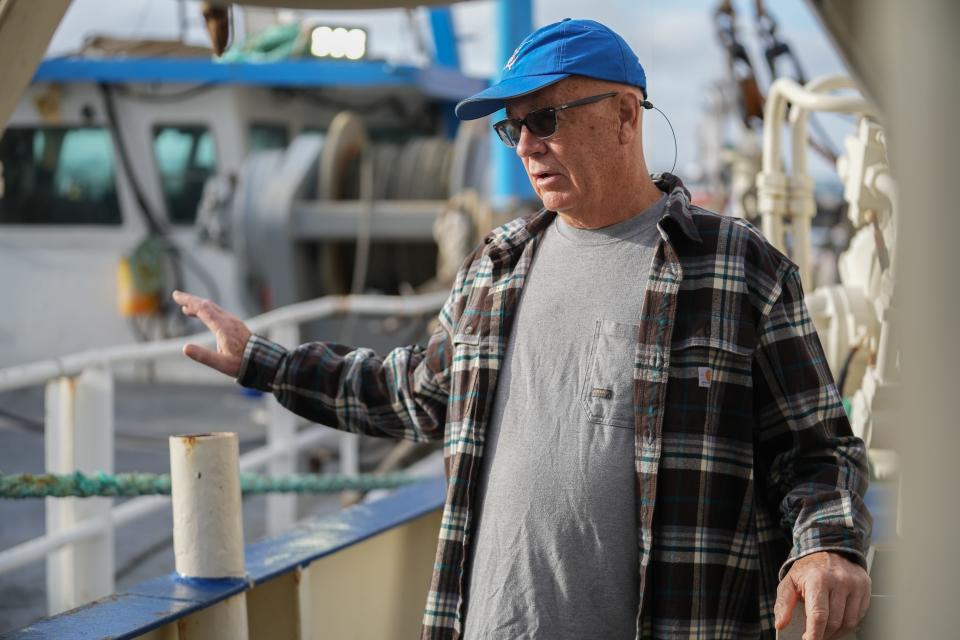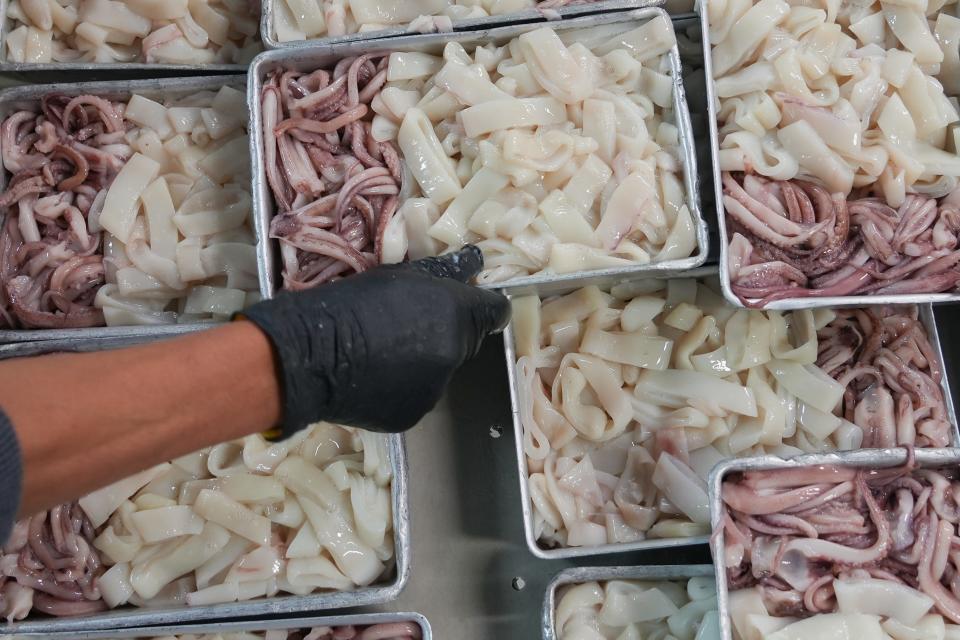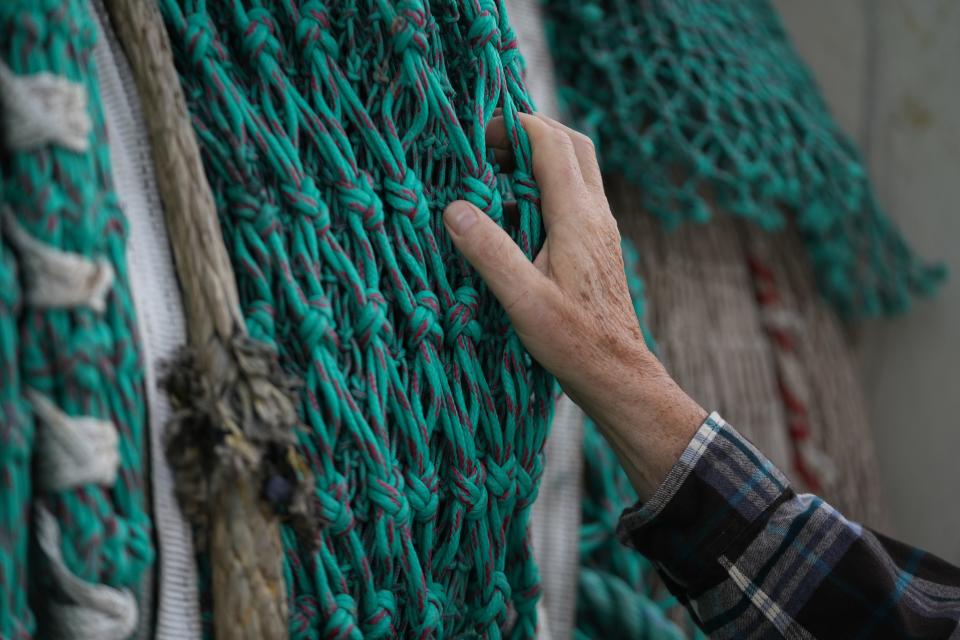A group of herring fishermen may put a hook in the Biden administration's power
CAPE MAY, N.J. – Even far out on the open water, where Bill Bright navigates his 140-foot fishing trawler in search of the Atlantic herring that school below the surface, the federal government always feels startlingly within reach.
Bright and other captains alert regulators before they push off. A reporting system pings the boat's location throughout the day. And sometimes Bright must bring a government mandated federal observer on board whose job is to collect data about the catch and ensure the rules are followed.
Bright doesn't mind those regulations. But he and his fellow fishermen are adamantly opposed to a 2020 federal rule that requires them to pay the salary of the observers they bring aboard – adding $700 a day to their costs.
A yearslong legal battle between four family owned fishing companies and the Department of Commerce over that rule will be debated at the Supreme Court on Wednesday. One of the most important cases of the current term, its resolution could spillover into other industries, significantly weakening the ability of federal agencies to regulate the environment, workplace conditions, food safety and other areas of American life.
Beep: She got a ticket for beeping her car horn. Now she's asking the Supreme Court to sound off.
Curbing agency power has been a decadeslong project of the conservative legal movement. The government, its proponents say, wields too much power to approve regulations with little or no input from Congress.
But for Bright, the case isn’t about some ideological crusade. Instead, he said, it’s personal.
“I understand that this is a big political thing," said Bright, who has been working in the seafood industry for 40 years. "But this is not politics to me. This is about what's right. This is about what's right for our fishery.”

Putting Biden on the hook
Federal courts – including the Supreme Court – have been clamping down on attempts by federal agencies to make regulations without approval from Congress for years. When President Joe Biden's administration attempted to extend an eviction moratorium during the COVID-19 pandemic, it was rebuffed by the courts in 2021. When he tried to wipe out student loans for millions of Americans, the Supreme Court knocked that idea down, too.
At the center of the dispute over the herring observers is a question of how much deference courts must give to government agencies when they approve regulations that aren’t specifically authorized in the law. Since a landmark 1984 Supreme Court decision, courts have deferred to agencies as long as their interpretation of a law is “reasonable.”
Lower courts interpreted a 1976 law related to the National Marine Fisheries Service as permission to make companies pay for government observers. That law gave the agency the power to impose regulations that are ''necessary and appropriate'' to manage species. This law and regulations were crafted to prevent overfishing.
Bright and his colleagues argue the law doesn’t say anything specifically about charging the fishing industry for the observers. They are asking the Supreme Court to end ? or at least pare back ? the deference courts give to agencies in that situation. If the justices adopt the approach, it will affect industries far beyond fishing.
“This case is not just about a few fishermen and a monitor,'' said William Buzbee, a Georgetown Law professor who specializes in environmental and administrative law. ''This case is a vehicle to maybe recast the way our government works from top to bottom ... discrimination, food safety, pollution, the ability to have safe fish ? the ability to find fish ? all of these things will be affected by this court's ruling.”
In its briefing, the Biden administration has noted that the government stopped the program last year. It warned of a “convulsive shock to the legal system” if deference to agencies is overturned.

A trophy catch for conservatives
The debate over agency deference is often framed in partisan terms, with conservatives seeking to reduce the power of the “administrative state.” Ironically, deference was created in a case that cut back on regulations – and it was applauded by conservatives at the time. In Chevron v. Natural Resources Defense Council, decided in 1984, the court allowed the Reagan administration to weaken clean air regulations.
But more recently, conservatives have argued the decision gave too much leeway to agencies and not enough to the courts, which are charged under the Constitution with interpreting laws.
"They began to say, 'This isn’t helping us. This is hurting us," said David Doniger, the Natural Resources Defense Council attorney who argued the 1984 case before the court – and lost.
Rather than overturning the 1984 decision, the Supreme Court could say judges have to spend more time determining if a law is clear in the first place. But if the justices rule agencies get no deference, Doniger said, judges could impose personal policy preferences on rules governing air and water pollution, food and drug safety, financial regulations and more.
“And if you get conservative judges in Texas going one way and then liberal judges in California going another way, you're going to have chaotic legal interpretations of the same or similar issues,” he said. The Supreme Court will hear two cases involving the fishermen Wednesday: Loper Bright Enterprises v. Raimondo and Relentless v. Department of Commerce.

Netting a win at the Supreme Court?
Bright and others in the seafood industry say they’re not opposed to federal rules meant to ensure a healthy population of fish. After all, their livelihoods depend on the sustainability of the herring, most of which is shipped for use as bait in New England lobster pots.
“My grandfather got up every morning and he went fishing with no net sizes, no mesh sizes, no quotas, no restrictions ? he just went fishing,” said Wayne Reichle, president of Lund’s Fisheries and the owner of two the boats involved in the case.
Today, Reichle said, the industry has learned to live with an era of regulation that’s changed all that.
“So the idea that we're out overfishing or wanting to overfish is the furthest thing from the truth,” he said. “I can't stress enough how important it is for us to have healthy oceans and healthy fish stocks.”
But, Bright said, there’s also the bottom line he needs to consider each trip. He spends thousands of dollars on fuel every day. The boats and nets and gear need maintenance. And sometimes he spends days at sea without any income at all. Catching fish is never guaranteed.
“Every day you're out there, there's a high cost,” Bright said.
The challenges the industry is facing – the weather, the cost and the rules – often seem at the top of Bright’s mind.
So, too, is the chance for success.
“Even now, when you have all these odds against you, when you come back from a trip (with) fish there is not a better feeling,” he said. “It's been for 40 years, and it’s still thrilling.”

This article originally appeared on USA TODAY: Supreme Court may reel in government power with fishermen's appeal
